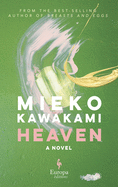
| Publisher: | Europa Editions | |
| Genre: | Psychological, Friendship, Literary, Coming of Age, Fiction | |
| ISBN: | 9781609456214 | |
| Pub Date: | May 2021 | |
| Price: | $23 |
| Starred | Fiction |
by Mieko Kawakami, trans. by Sam Bett, David Boyd
"Brutal" doesn't convey enough of the utter horror of Mieko Kawakami's sophomore import, Heaven. Translated from the Japanese by Sam Bett and David Boyd, who enabled the stupendous success of Kawakami's English debut novel, Breasts and Eggs, Heaven further confirms Kawakami's superb literary ability to expose and disturb.
A folded note tucked into a pencil case inaugurates an unlikely friendship between two middle-graders who have little in common beyond the relentless bullying both endure at school: "We should be friends," Kojima writes to her classmate, dismissively labeled "Eyes" by his tormentors for wearing glasses due to his amblyopia. The girls target Kojima for her unkempt presentation, but their attacks on her are comparatively milder than the outright assaults the 14-year-old narrator survives--the bullies' initial caution not to leave visible marks devolves into covering him with a split-open volleyball and viciously using his head for soccer. The abused pair maintain an in-school silence, but outside--via handwritten notes, occasional meetings, a summer museum daytrip--their relationship provides lifesaving respite. Their innocent, desperate bond delivers "happamine... it's, like, dopamine that comes out when you're really happy." But the threat of "unhappamine" is inevitable.
Kawakami is unblinking in her graphic depictions of what the children suffer--the punishments made more abhorrent with the understanding that the perpetrators, too, are children. The absence of adult oversight is also profoundly jarring. Even more remarkable is Kawakami's ability to move from such abject terror to the private, separate heaven to which the bullied pair occasionally escape. Despite the suffocatingly looming violence, the duo's intense, forced-to-be-mature inner lives will keep readers mesmerized to the final page. --Terry Hong, Smithsonian BookDragon
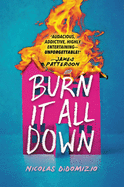
| Publisher: | Little, Brown | |
| Genre: | Friendship, Family Life, Humorous, Black Humor, General, Coming of Age, Fiction, Gay, LGBTQ+ | |
| ISBN: | 9780316496957 | |
| Pub Date: | May 2021 | |
| Price: | $28 |
| Starred | Fiction |
by Nicolas DiDomizio
In the side-splitting, soul-searching debut novel Burn It All Down, Nicolas DiDomizio shares the coming-of-age story of a teen boy hiding out from the law with his partner-in-crime: his mom.
When 18-year-old Joey Rossi's first serious boyfriend cheats on him, he's heartbroken but not surprised. Gia, his 34-year-old mother and best friend, is furious on his behalf, because "emotions aren't something Mom and I are capable of experiencing separately." Gia herself has a history of getting cheated on by toxic men. When Gia's boyfriend jilts her for his wife, Joey drunkenly suggests a mother-son revenge binge. Sadly, their plan for garden-variety tire-slashing and dish-smashing goes horribly wrong when they accidentally burn down an entire house. Panicked, the duo makes a run for it, ending up at the remote home of Marco, Gia's ex and the only man ever to treat her right. While waiting for the other shoe to drop, Joey strikes up a clumsy romance with a cute, privileged neighbor boy and learns a truth about his mother that calls the dynamics of their entire relationship into question.
Told in Joey's smart-mouthed, aspiring standup comic voice, this surprising, touching story of a dysfunctional, codependent and ironically lovable parent-child team has heart, laughs and YA-crossover potential. A steady stream of one-liners grounds Joey and Gia's over-the-top actions in levity and wry honesty. Out-of-control but utterly human, these "felons without a plan" face their demons in their own inimitable style. --Jaclyn Fulwood, blogger at Infinite Reads
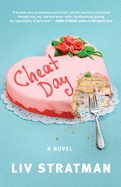
| Publisher: | Scribner | |
| Genre: | Women, Family Life, General, Literary, Fiction | |
| ISBN: | 9781982140540 | |
| Pub Date: | May 2021 | |
| Price: | $26 |
| Fiction |
by Liv Stratman
In the plucky Cheat Day, Liv Stratman's debut novel, fad dieter Kit Altmann is determined to stick with her strict new 75-day eating regimen. But while she's trying to resist alluring foods, she's faced with an even more tantalizing temptation that won't fit on a plate.
On Valentine's Day and at Kit's insistence, she and her workaholic husband begin the Radiant Regimen: "It's an intensive wellness program," Kit informs her sister, Melissa, who believes that " 'program' is just a culty word for 'diet.' " A further test of Kit's willpower: she has just returned to her job as floor manager at Sweet Cheeks, the Brooklyn bakeshop that Melissa co-owns. But when Sweet Cheeks hires a tall, tattooed carpenter to build new shelves, Kit finds him more seductive than food: "I was married to a man I really loved. But for some reason, in the company of Matt Larsson, I felt my unhappiness--and my constant hunger--subside."
A chief satisfaction of the novel is the way it allows readers to peek around Kit's unreliable narration at what's really going on in her life. While Stratman overuses eye-rolling and other gestures to signal characters' attitudes, Cheat Day's mitigating pleasures include its ready humor and its fully fleshed portrait of Brooklyn's Bay Ridge neighborhood as it tries to maintain its identity while the hipsters move in. Despite its urban setting, Cheat Day has a leisurely pace, with Stratman taking her time to assemble her mise en place but finally delivering a fully baked, flavorful treat. --Nell Beram, author and freelance writer
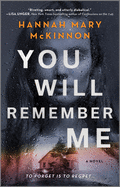
| Publisher: | Mira | |
| Genre: | Psychological, Family Life, Domestic, Suspense, Thrillers, Fiction, Siblings | |
| ISBN: | 9780778331810 | |
| Pub Date: | May 2021 | |
| Price: | $16.99 |
| Mystery & Thriller |
by Hannah Mary McKinnon
Identity questions and layers of lies propel Hannah Mary McKinnon's third psychological thriller, which may begin slowly but soon heats up as it leads to a satisfyingly surprise finale. The quietly measured pace at the start of You Will Remember Me unfolds into complex character studies.
Jack Smith is "The Man from the Beach" because he wakes up on the beach in Brookmount, Md., with no memory, his identification and cell phone missing. With a dim memory of Maine, Jack travels to the small town of Newdale, where he learns his stepsister, Maya, has been frantically searching for him for two years. His real name is Asher Bennett, and he was involved in the deaths of two women. His worried girlfriend Lily also heads for Maine after discovering just how little she knew about "Jack" following her search of his home. Despite feeling betrayed, Lily acknowledges that she also has been lying about her past.
Each character navigates a sea of obsession and deception, with past crimes threatening to overwhelm the present. Asher's relationships with Maya and Lily appear to be strong but begin to fray as gossip and backbiting take their toll. A seemingly normal domestic situation disintegrates as each learns the other's secrets and Asher regains his memory. McKinnon (Dear Sister) slyly injects a strong sense of suspense as You Will Remember Me leads to an unexpected ending. --Oline H. Cogdill, freelance reviewer
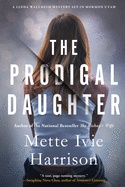
| Publisher: | Soho Crime | |
| Genre: | Family Life, Mystery & Detective, Religious, General, Fiction, Women Sleuths | |
| ISBN: | 9781641292450 | |
| Pub Date: | May 2021 | |
| Price: | $27.95 |
| Mystery & Thriller |
by Mette Ivie Harrison
Mettie Ivie Harrison is no stranger to highlighting the complicated intricacies of the Utah Mormon communities in which she lives. Her bestselling Linda Wallheim mystery series unmasked domestic abuse in The Bishop's Wife; anti-LGBTQIA doctrines in His Right Hand; polygamous patriarchy in For Time and All Eternities; immigration injustice and race-based inequity in Not of This Fold. In the fifth of a plotted 11 volumes, The Prodigal Daughter, Linda returns to champion the silenced.
Linda remains very much the titular bishop's wife, but her marriage is struggling--her five sons are grown, her feminism unwelcome and she's become "the villain in everything and Kurt [is] the poor, long-suffering hero who had to put up with a wayward, unrepentant wife." When their eldest son calls for her assistance in locating his daughter's beloved babysitter--15-year-old Sabrina, whose parents seem strangely unconcerned about her disappearance--Linda won't refuse. She quickly sleuths why Sabrina left home; locating her proves surprisingly easy. Keeping Sabrina safe will be a different challenge.
Throughout the series, "Mormonism [becomes] a dividing line." Harrison, who has distanced herself from formal church affiliation but considers herself " 'Mormon' in a broader, cultural sense of the term," has followed a seemingly untraditional path: she finished her Princeton Ph.D. at 23, she's a former professor and Huffington Post blogger, and a nationally ranked triathlete. She imbues her tenacious protagonist with her independence, and her own conflicts with religious dogma give her fiction indelible nuance. Readers won't find easy answers or even satisfying resolution here: that reality check continues to enhance her series with enduring authenticity. --Terry Hong, Smithsonian BookDragon
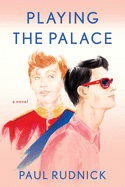
| Publisher: | Berkley | |
| Genre: | Romantic Comedy, Romance, General, LGBTQ+ - Gay, Fiction, LGBTQ+ | |
| ISBN: | 9780593099414 | |
| Pub Date: | May 2021 | |
| Price: | $16 |
| Romance |
by Paul Rudnick
In this feel-good meet-cute, Carter Ogden is just scraping by: almost 30, recently heartbroken by a cheating ex-boyfriend, making ends meet (barely) as an "Associate Event Architect." He likens himself to St. Patrick's Cathedral, "silly and theatrical," and wants nothing more than to find a sense of purpose and meaning in his life that could live up to the spirit of Ruth Bader Ginsburg, whom he idolizes.
Prince Edgar, also known as the Crown Prince of England, is one of the few "out dreamboats on such an international level." Unlike Carter, he is put together, polished and just about perfect in every way--or so it appears to those outside his inner circle.
The cross-Atlantic relationship between the two--condemned by everyone from Carter's Broadway-loving best friends to the actual Queen of England--forms the center of Paul Rudnick's Playing the Palace, as sparks fly, hearts grow and an international media storm kicks up around them. It's a "guy next door falls for royalty" story that's been done in other ways, but in Rudnick's capable hands, the story feels fresh and exciting. A playwright, screenwriter and essayist in addition to a novelist, Rudnick (Gorgeous; I Shudder) imbues every page of Playing the Palace with a sense of humor and quick-witted snark. It combines the best laugh-track pacing of a sitcom with the big-hearted story arc of a romantic comedy. The over-the-top storylines and characters are guaranteed to leave even the most cynical readers rooting for an improbable happily-ever-after. --Kerry McHugh, blogger at Entomology of a Bookworm
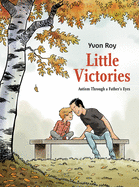
| Publisher: | Titan Comics | |
| Genre: | Family & Relationships, Parenting, Pediatrics, Biography & Memoir, Nonfiction, Medical, Fatherhood, Comics & Graphic Novels | |
| ISBN: | 9781787732308 | |
| Pub Date: | May 2021 | |
| Price: | $19.99 |
| Graphic Books |
by Yvon Roy
Yvon Roy's autobiographical Little Victories opens with what must be one of the most charming visual depictions of conception. Mark (Roy's alter-ego) and Chloe's union proves "magnificent": their relationship is joyous, their newborn son the wished-for "mini-me." But 18 months later, Oliver "still hasn't said a single word," leading the trio to visit an evaluation clinic that burdens them with an ominous diagnosis: autism. Mark dismisses "these meetings where the officials talk hot air like they're Nobel Prize winners," while he mourns a future that Oliver may never have and everything else he had hoped to share as father and son. His rage sends Chloe and Oliver packing--literally--until he's able to "stop feeling sorry for [himself]" and embrace what is possible. Working closely with Chloe despite a permanent split--"we're a family," they both promise--Mark advocates and encourages Oliver through the years with a rich, full life.
As affecting as the shaded black-and-white drawings are, Roy's occasional graceless moments are hard to overlook: an insensitive use of Chinese characters (some even made up) to denote what he can't understand; casual, careless misogyny ("I exchanged [the ballerina] for a journalist"). Disappointments aside, Roy's artistry is irresistible, as he agilely reveals Mark's raw, intimate, soul-baring journey. Mark's frustrations, especially with an expert system that doesn't fit his family's needs, lead him away from conventional methods as he relies on his own intuition to communicate and bond with Oliver. Roy makes no claims about how to parent an autistic child; instead, he documents how one father and one autistic son dealt with difficult challenges toward greater understanding. --Terry Hong, Smithsonian BookDragon
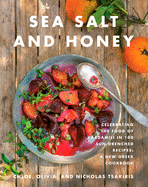
| Publisher: | Harper Design | |
| Genre: | Mediterranean, Cooking, Regional & Ethnic, Specific Ingredients, Greek, Natural Foods | |
| ISBN: | 9780062917355 | |
| Pub Date: | May 2021 | |
| Price: | $35 |
| Food & Wine |
by Chloe, Olivia and Nicholas Tsakiris
Readers will savor a feast for the eyes and the palate in Sea Salt and Honey: Celebrating the Food of Kardamili in 100 Sun-Drenched Recipes: A New Greek Cookbook. With an abundance of full-page color photos of their tiny Greek village, the surrounding Taygetos mountains and the bright blue sea, it seems like a bonus that author Nicholas Tsakiris and his daughters, Chloe and Olivia, fit 100 recipes (plus sumptuous food photos!) in their book.
A native of Crete, Nicholas lived for decades in the United States, where his daughters were born. On a trip back to Greece he discovered Kardamili, where he feels "simultaneously on an endless vacation and also at home." Olivia eventually joined him, and Chloe visits from New York. "Rooted in the seasons," their food is "healthful, fresh, and uncomplicated," and doesn't hew to a "typical" Greek menu. For example, a favorite is their version of Buffalo chicken wings: roasted cauliflower florets with a sea salt and honey hot sauce that includes extra-virgin olive oil (a staple in their kitchen) and three types of chilis.
"Or substitute" thoughtfully appears in recipes when ingredients are regional or intimidating, but the inviting dishes really are uncomplicated, as promised. From snacks through teas and desserts, these 100 recipes are steeped in a deep affection for Kardamili's lifestyle and bounty. Even if sea salt gathered from the local beach, or honey "from the wildflowers blanketing the mountains," are out of reach, cooks around the world will eagerly re-create the tastes of this exceptional corner of Greece. --Cheryl McKeon, Book House of Stuyvesant Plaza, Albany, N.Y.
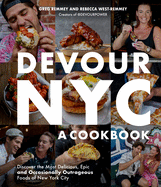
| Publisher: | Page Street Publishing | |
| Genre: | American - General, Comfort Food, Cooking, Individual Chefs & Restaurants, Regional & Ethnic | |
| ISBN: | 9781645671978 | |
| Pub Date: | May 2021 | |
| Price: | $21.99 |
| Food & Wine |
by Greg Remmey, Rebecca West-Remmey
Whether someone craves a perfect burger, the most moreish wings or the sweet stuff, there is nothing like comfort food. In Devour NYC: A Cookbook, Greg Remmey and Rebecca West-Remmey, the team behind the riveting @DevourPower social media outlets and blog, prove that New York City does comfort food right. This book features 50 of the city's most decadent, most drool-worthy combinations, broken down and simplified so that a taste of the Big Apple can be assembled and enjoyed at home.
The seven chapters cover sandwiches, burgers and hot dogs, pizza, Mexican food, wings, appetizers and desserts from well-known favorites such as East Village Pizza, Dos Toros Taqueria, Harlem Public and Macchina, with beautiful photography sure to provoke a healthy appetite. For those who'd rather not tackle these in their own kitchens, Devour NYC serves as a guidebook for a food tour around New York City. No combination is off limits: for those who cannot choose between seafood and a burger, the Shrimp Big Mac 'n' Cheese Burger from Flip 'N Toss deserves a second look. Can't decide between cookies or cake for dessert? Schmackary's Funfetti Cookie Cakes are sure to be a crowd pleaser. Mac & cheese gets the pepperoni pizza treatment, and there is culinary fusion in spades, across cuisines and meals, including bulgogi cheesesteak tacos, a scrapple and egg burger, and Dominican pizza. There are even instructions to make your own burrata. Devour NYC is a foodie's dream come true. --Michelle Anya Anjirbag, freelance reviewer
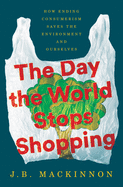
| Publisher: | Ecco | |
| Genre: | Economics, Human Geography, Sociology, Future Studies, Business & Economics, General, Macroeconomics, Social Science | |
| ISBN: | 9780062856029 | |
| Pub Date: | May 2021 | |
| Price: | $28.99 |
| Social Science |
by J.B. MacKinnon
An eloquently crafted and timely read, The Day the World Stops Shopping: How Ending Consumerism Saves the Environment and Ourselves by J.B. MacKinnon is structured around the existential dilemma at the heart of 21st-century consumerism: we must stop shopping and over-consuming resources to save the planet, but to do so would destroy the world economy. MacKinnon points to evidence of unusually clear skies across cities during the Covid-19 pandemic lockdown to illustrate the speed and scale at which a reduction in consumerism can positively affect the climate.
Against the backdrop of unsustainable economic growth--the U.S. uses the planet's resources at a rate 1.7. times faster than it can regenerate--MacKinnon makes a credible case for drastically reducing consumption. He visits communities where social and economic life are not centered on consumerism--the Kalahari Desert in Namibia, Ecuador and Japan's Sado Island--and shares inspirational stories of people who have a deeper, more meaningful relationship to their limited material possessions and a more balanced attitude toward leisure and work than do earn-and-spend cultures in wealthier countries. The hunters of the Kalahari, for example, intentionally live "below capacity," taking from the land only what they need and leading enviable, contented lives of "affluence without abundance."
A Canadian journalist and author, MacKinnon's (Dead Man in Paradise; The Once and Future World) persuasive reporting, and the encouraging story of his personal quest to stop shopping, will motivate readers critically to review their own consumer habits. --Shahina Piyarali, reviewer
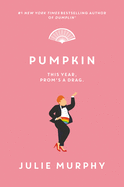
| Publisher: | Balzer + Bray | |
| Genre: | Friendship, Dating & Sex, Emotions & Feelings, Social Themes, Young Adult Fiction, LGBTQ+ | |
| ISBN: | 9780062880451 | |
| Pub Date: | May 2021 | |
| Price: | $17.99 |
| Starred | Children's & Young Adult |
by Julie Murphy
An aspiring drag queen grows to embrace his body and individuality in this winning YA contemporary novel.
Waylon Brewster, who is fat and "the kind of gay that announces itself and asks for a wide berth," has always stood out in his small West Texas hometown. Waylon is counting down the days until he can transform into "Waylon Stage Three": graduate, move to Austin with his twin sister, Clementine, and live his truth. For now, Waylon wants to keep a low profile, but a video of him auditioning for the drag competition Fiercest of Them All goes viral. When, as a "joke," Waylon is nominated for prom queen and Hannah, Clementine's Afro-Dominican girlfriend, is nominated for prom king, the two decide they'll show the haters by running for the crown and winning. Finally, Waylon steps into the spotlight and learns to live for the present after spending years "waiting for my moment."
Julie Murphy (Dumplin'; Puddin') populates Pumpkin with a captivating cast of supporting characters, including Clementine and Waylon's eccentric grandmother; the annoyingly handsome prom king nominee Tucker Watson; and Waylon's "self-proclaimed frenemy," Kyle Meeks. Waylon's relationships with these characters form the emotional core of Pumpkin; moments of humor and warmth work together with commentary on body positivity and gay rights. Waylon often feels like "I have to offer something... that absolves me of being fat and gay," but, happily, finds self-acceptance through his drag alter ego, Miss Pumpkin Patch. Murphy celebrates Waylon and drag as "more than makeup and gowns and bodysuits and tucking and sequins and wigs. [It's] about what you exude." --Alanna Felton, freelance reviewer
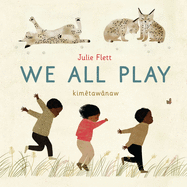
| Publisher: | Greystone Kids | |
| Genre: | United States - Native American, Friendship, Animals, People & Places, Baby Animals, Social Themes, Imagination & Play, Juvenile Fiction | |
| ISBN: | 9781771646079 | |
| Pub Date: | May 2021 | |
| Price: | $17.95 |
| Children's & Young Adult |
by Julie Flett
In a note at the back of We All Play, the Cree-Métis author/illustrator Julie Flett writes that when she was growing up, "my dad shared a lot about our relationship to animals and to each other, including the land, plants, beetles, the earth, wind, water, and sky." We All Play is a picture book showcase of that reciprocity. It stars cavorting kids and animals keen to illustrate the idea that, as Flett puts it, "we are all connected, living in relationship and in care to one another, in kinship"--or, to use the Cree word the author provides, wâhkôhtowin.
"Animals hide and hop/ and sniff and sneak/ and peek and peep." So begins a trio of animal-centered riffs that conclude with the refrain "We play too!/ kimêtawânaw mîna." The illustrations corresponding to the refrain show kids carrying out the human version of the animal actions demonstrated on previous pages. After all that rollicking, who wouldn't be tuckered out? Quite understandably, the book's concluding action verb-packed riff ends with a sober pronouncement: "And slowly, side by side, animals fall asleep./ We do too. nîstanân mîna.../ zzzz."
Flett (Birdsong; Johnny's Pheasant) delivers her customary clutter-free layouts, ensuring that the reader's focus will be squarely on the gamboling or otherwise occupied children and critters. All creatures are set against off-white backdrops harboring a contextualizing detail or motif. At the back of the book is a list of the featured animals' names in both English and, in singular and plural form, Cree, as well as a basic pronunciation guide for the Cree words. The animal-names list also includes the "younger, smaller, cuter" form of every creature's name in Cree. But let's be clear: as far as "cuter" goes, all of Flett's critters would qualify. --Nell Beram, freelance writer and YA author
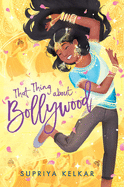
| Publisher: | Simon & Schuster | |
| Genre: | Fantasy & Magic, Dance, Family, Marriage & Divorce, Juvenile Fiction, Performing Arts, Diversity & Multicultural | |
| ISBN: | 9781534466739 | |
| Pub Date: | May 2021 | |
| Price: | $17.99 |
| Children's & Young Adult |
by Supriya Kelkar
Family and friend struggles lead to a dramatically (and magically) altered universe for Sonali, an Indian American sixth-grader, in this poignant, entertaining middle-grade novel by Supriya Kelkar (American as Paneer Pie; Ahimsa).
Sonali has stuck to her decision never to share her feelings, ever since a disastrous family party five years ago when she presented a poster board display titled "Why Parents Shouldn't Fight." "All it led to was uncomfortable stares, being made fun of, upset parents, and nothing changing anyway." As the years go by and her parents' fighting escalates, Sonali knows for sure that the one thing she doesn't want to do is get as emotional as her little brother does--so emotive that she believes he "would be a perfect fit in a Bollywood movie." Although Sonali loves her family's weekly Bollywood movie nights at home, the "loud, exaggerated, and colorful" displays make her uncomfortable. So Sonali is horrified when she wakes up the morning after her parents announce they are separating to find that her life has become a Bollywood movie. Suddenly, she can't stop herself from performing flamboyant dance routines and bursting into song any time her emotions start to get out of control.
Supriya Kelkar uses the distinct lens of Bollywood films to explore the adolescent challenge of balancing one's emotional life--Sonali is a literary every-tween, watching in horror as her body and voice betray her. Take the inherent awkwardness of middle school, add in a family crisis and a girl's dogged commitment not to lose emotional control, frame the entire drama in Freaky Friday-like magic, and you have a script for a middle-grade novel that will have readers cringing in empathy one minute and laughing the next. --Emilie Coulter, freelance writer and editor